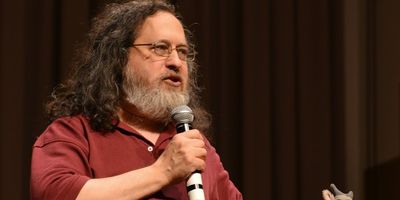Richard Stallman
Richard Stallman (1953 - ?) is a software engineer who founded the GNU project and the Free Software Foundation. Stallman has spent much of his life as a tireless campaigner against proprietary software and software patents and what he views as the excessive encumbrances of copyright. He is also known as the developer of the free text editor Emacs used in Linux and Unix operating systems.
Stallman is a 1974 Harvard University Physics graduate. The GNU project was primarily an ethical initiative which Stallman announced in September 1983 on net.unix-wizards and net.usoft[1]. He began his announcement: "Starting this Thanksgiving I am going to write a complete Unix-compatible software system called GNU (for Gnu's Not Unix), and give it away free to everyone who can use it. Contributions of time, money, programs and equipment are greatly needed." This announcement,[2] is widely thought of as the launch of the free software movement, although its deep roots lie in hacker culture.
In the 1990’s, the organization he founded to advocate for free software split into two parts: 1) Free Software Foundation (Stallman’s first priority), and 2) the “Open Source” movement (a term coined at the time of the split to differentiate it from the Free Software Foundation). Stallman remained with the Free Software Foundation, focused on the ethical issues surrounding misuse of digital technology and the dangers and hidden costs of relying on proprietary software. The Open Source movement, in contrast, is focused on finding the best ways to develop software as a group, and while Stallman does not disagree with Open Source aims, he chooses to keep the two purposes completely separate.
In a 2011 talk to the Computer Science department at the University of Pennsylvania[3], Stallman made the following points, which summarize his advocacy for the Free Software Foundation:
- The Kindle he calls a “Swindle”, and the Nook a “Schnook”, because we may not lend a book we have purchased to our friends, and because the seller can recall a book from our possession at any time (as Amazon once famously did with George Orwell’s “1984”).
- Modern devices (including cable boxes, cell phones, and computers) often surveil us and may subject us, later, to censorship.
- The use of proprietary and closed data formats and software increases the chances of our privacy being invaded, and decreases our ability to learn the art of software programming.
- If only all the effort and expense devoted to the public war on sharing, deemed by Stallman as an attack on community (including Digital “Restrictions” Management (DRM), and the Digital Millenium Copyright Act that makes it illegal for us to know how some software works) could be redirected towards, say, preventing automobile accidents, thousands of lives per month might be saved.
- The precariousness of our right to access the global internet is lamentable, because according to Stallman, “the U. S. governement has been bought”.
- Stallman asserts that it is every citizen’s duty to poke Big Brother in the eye.
- Blame the government, he says, and blame the companies the U S Government works for.
- If anyone wishes to record and publish his speeches, Stallman only gives permission if the recording is first converted to the free audio format Ogg Vorbis.
In 2019, Stallman ran amok of public sentiment when private emails of his were exposed which seemed to defend fellow MIT colleague Marvin Minsky of charges that Minsky either participated in, or benefited from, Jeffrey Epstein's sex trafficking circle. At that time, Stallman resigned from the board of the Free Software Foundation. Stallman's decision to return to the board of FSF in 2021 has caused a firestorm of objection across the internet. Past comments of Stallman's have been dredged up that allege to prove, also, that Stallman is tolerant of pedophilia. His popularity is at an all-time low and probably ruined forever.
notes
- ↑ Stallman's announcement of GNU
- ↑ net.unix-wizards (googlegroups)
- ↑ Recordings of Stallman's 2011 talk are available in two parts: Part 1 and Part 2 (these are zipped. Ogg Vorbis encoded recordings).
